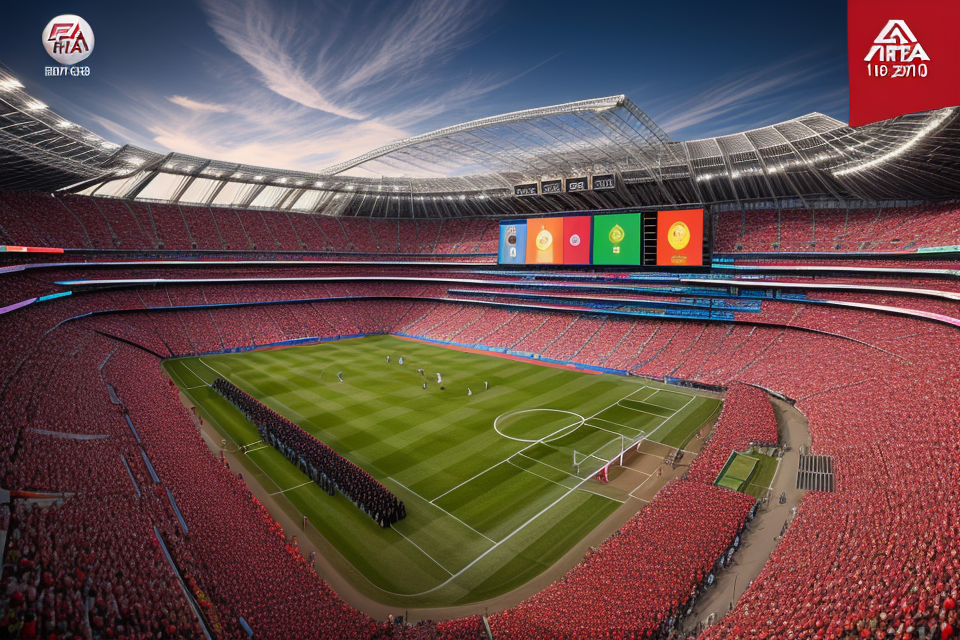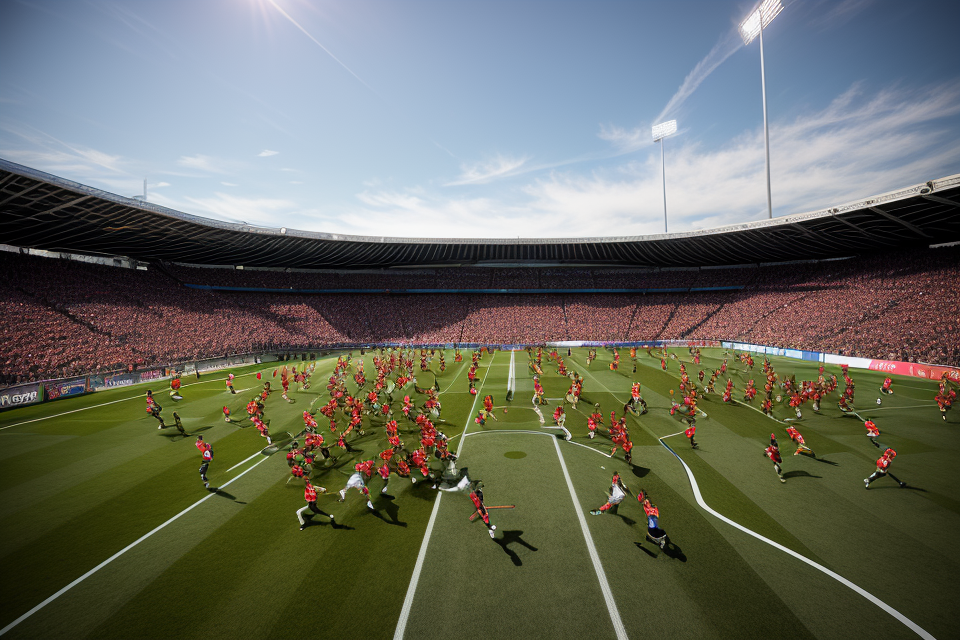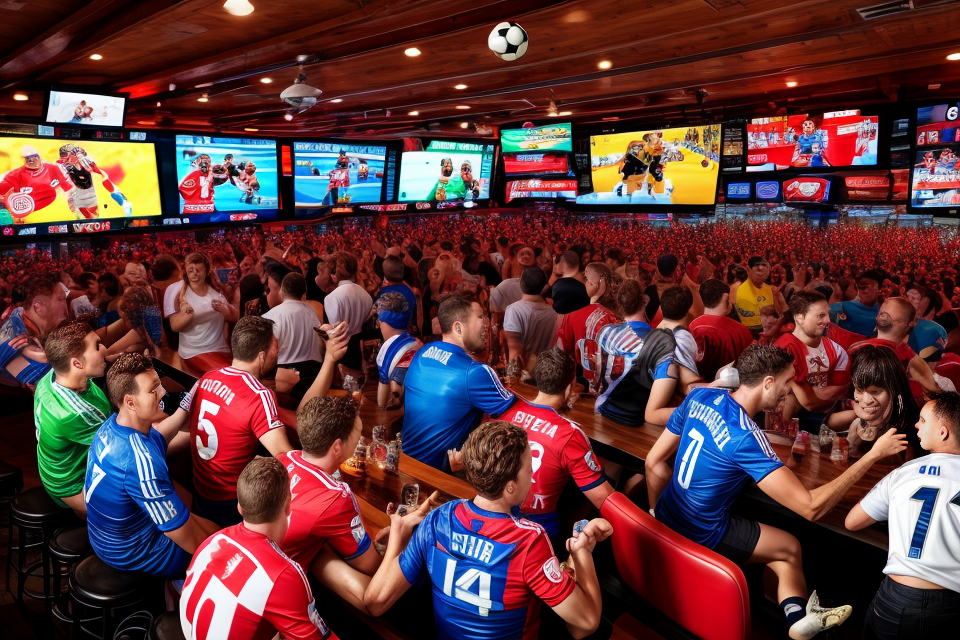Soccer, also known as football, is one of the most popular sports in the world. Millions of people from different countries gather to watch and participate in the game. The major tournament for soccer is the World Cup, which is held every four years. The World Cup is the largest soccer tournament in the world, where teams from different countries compete against each other to become the world champion. This tournament is highly anticipated by fans and players alike, as it is a chance to showcase their skills and represent their country on a global stage. In this comprehensive guide, we will explore the history, format, and significance of the World Cup, and why it remains the most prestigious tournament in the world of soccer.
What is the World Cup?
The World Cup is the most prestigious international soccer tournament in the world, featuring teams from all over the globe. The tournament is held every four years and is organized by the International Federation of Association Football (FIFA). The World Cup is a highly anticipated event, with millions of fans tuning in to watch the matches and cheer on their favorite teams.
The Ultimate Soccer Tournament
History and Significance
The first World Cup was held in 1930 in Uruguay, and since then, it has become a staple of international soccer. The tournament has a rich history, with many iconic moments and legendary players. The World Cup is not just a sporting event, but a cultural phenomenon that brings people from different countries together.
Format and Structure
The World Cup is a knockout tournament, with 32 teams participating. The teams are divided into eight groups, with four teams in each group. The teams play against each other in a round-robin format, with the top two teams from each group advancing to the knockout stage. The knockout stage consists of 16 teams, with the final match being played at the end of the tournament. The format and structure of the World Cup ensure that the best teams and players compete against each other, making it the ultimate soccer tournament.
Qualifying for the World Cup
The Road to Glory
FIFA Rankings
The FIFA rankings play a crucial role in determining the qualifying teams for the World Cup. These rankings are based on a team’s performance over the past four years, with a greater emphasis on recent matches. The rankings are calculated using a points system, with each team earning points for wins, draws, and losses. The higher a team’s ranking, the more likely they are to qualify for the World Cup.
Qualifying Tournaments
In addition to the FIFA rankings, qualifying tournaments are held to determine the teams that will compete in the World Cup. These tournaments are held regionally, with each continent hosting its own qualifying tournament. The number of teams that each region sends to the World Cup is determined by the FIFA Council, based on the size and strength of the region’s soccer associations.
Continental Qualifiers
The continental qualifiers are the final stage of the qualifying process for the World Cup. These tournaments are held in each of the six continental confederations (AFC, CAF, CONCACAF, CONMEBOL, UEFA, and OFC), and they determine the teams that will represent each confederation at the World Cup. The teams that win their respective continental qualifiers will earn a place in the World Cup finals.
The Host Nation
The Venue for World Cup Glory
Stadiums and Infrastructure
The World Cup is the largest soccer tournament in the world, and it requires a significant amount of infrastructure to host it. The host nation must have top-notch stadiums that can accommodate large crowds and provide a great viewing experience for fans. These stadiums must also have state-of-the-art facilities to ensure the safety and comfort of the players. In addition to the stadiums, the host nation must also have adequate transportation and accommodation facilities for the teams, officials, and fans.
Organizing Committee and Preparations
The host nation must also have a dedicated organizing committee that is responsible for planning and executing the World Cup. This committee must work tirelessly to ensure that everything runs smoothly, from the construction of stadiums to the transportation of fans. They must also work closely with FIFA, the governing body of international soccer, to ensure that the tournament meets all of the necessary standards.
Impact on the Host Nation
Hosting the World Cup can have a significant impact on the host nation’s economy and culture. It can provide a boost to the tourism industry, create jobs, and increase the country’s profile on the international stage. However, it can also be a significant financial burden, and there may be concerns about the long-term sustainability of the infrastructure built for the tournament. Additionally, there may be concerns about the potential disruption to the host nation’s daily life during the tournament.
The Teams
A Global Showcase of Soccer Talent
Rankings and Performances
The teams participating in the World Cup are ranked based on their performance in previous tournaments and their current form. The highest-ranked teams are considered the favorites to win the tournament, while lower-ranked teams face an uphill battle to reach the final. The rankings and performances of the teams are closely watched by fans and experts alike, as they provide an indication of each team’s strengths and weaknesses.
Notable Teams and Players
The World Cup is a showcase of the best soccer talent from around the world. Many notable teams and players have made their mark on the tournament over the years. Some teams, such as Brazil and Germany, have a long history of success at the World Cup and are always considered strong contenders. Other teams, such as Italy and Argentina, have also enjoyed success in the past but have had their fair share of ups and downs. The players who have shone brightest at the World Cup include legends like Diego Maradona, Lionel Messi, and Cristiano Ronaldo, who have left an indelible mark on the tournament.
World Cup Legends
The World Cup has produced many legends over the years, players who have left an indelible mark on the tournament and become household names around the world. These players have inspired their teams to greatness and captivated fans with their skill, talent, and passion. From Pele and Maradona to Messi and Ronaldo, the World Cup has been graced by some of the greatest players in the history of the sport. These legends have helped to make the World Cup the most prestigious tournament in soccer and a source of inspiration for generations of players to come.
The Game Itself
Gameplay Analysis
Soccer, also known as football in many countries, is a sport that requires a high level of physical fitness, technical skill, and tactical knowledge. The game is played between two teams, each consisting of 11 players, on a rectangular field with a goal at each end. The objective of the game is to score goals by kicking the ball into the opposing team’s goal.
Formations and Tactics
The formation of a team refers to the arrangement of the players on the field. There are several common formations used in soccer, including the 4-4-2, 4-3-3, and 3-5-2. Each formation has its own strengths and weaknesses, and the choice of formation often depends on the team’s playing style and the opposing team’s formation.
Tactics refer to the overall strategy and plan of action used by a team during a match. Some common tactics used in soccer include pressing, which involves closing down space and making it difficult for the opposing team to play the ball, and counter-attacking, which involves quickly transitioning from defense to offense.
Skills and Techniques
Soccer requires a wide range of skills and techniques, including ball control, dribbling, passing, shooting, and heading. Players must also have good footwork, agility, and balance, as well as the ability to read the game and anticipate the movements of their teammates and opponents.
One of the most important skills in soccer is ball control. This involves being able to control the ball with different parts of the body, such as the feet, legs, chest, and head. Players must also be able to change direction quickly and move the ball smoothly to avoid losing possession.
Dribbling is another crucial skill in soccer. This involves moving the ball past opponents while maintaining control of it. There are several different dribbling techniques, including the step-over, scissors, and fake.
Passing is another important aspect of soccer. Players must be able to accurately pass the ball to their teammates, either short or long, and in different directions. There are several types of passes, including the through-ball, cross, and long ball.
Shooting is a key skill in soccer, as it is the primary way of scoring goals. Players must be able to strike the ball with accuracy and power, using different techniques such as the instep, laces, and volleys.
Heading is the ability to control the ball with the head. This skill is particularly important for attacking players, as it allows them to win headers and score goals. However, heading can also be dangerous, as it can lead to head injuries if not done properly.
The World Cup Experience
Beyond the Pitch
Fan Culture and Traditions
The World Cup is more than just a soccer tournament; it’s a global event that brings together fans from all over the world. Each country has its own unique fan culture and traditions, making the World Cup a melting pot of different customs and celebrations.
Some fans take their passion for their national team to the next level by dressing up in their team’s colors, waving flags, and creating elaborate chants and cheers. Others may go to great lengths to attend the games in person, traveling thousands of miles to see their team play in the flesh.
Media Coverage and Broadcasting
The World Cup is one of the most-watched sporting events in the world, with millions of people tuning in to watch the games on television or online. The media coverage of the tournament is extensive, with networks from around the globe broadcasting the games in multiple languages.
In addition to traditional television coverage, the World Cup is also available to stream online, allowing fans to watch the games on their computers, tablets, or smartphones. This makes it easy for fans to keep up with the latest action, no matter where they are in the world.
Social and Economic Impact
The World Cup has a significant impact on the host country’s economy, creating jobs and boosting tourism. The tournament attracts thousands of visitors from around the world, who come to watch the games and experience the local culture.
In addition to the economic benefits, the World Cup also has a social impact, bringing people from different cultures and backgrounds together. The tournament has the power to inspire and unite people, promoting a sense of global community and understanding.
Overall, the World Cup is much more than just a soccer tournament. It’s a celebration of sport, culture, and human connection, bringing people from all over the world together to share in the excitement and passion of the beautiful game.
The Future of the World Cup
The World Cup, the most prestigious soccer tournament in the world, has undergone several changes since its inception in 1930. From its initial format to the most recent edition, the tournament has evolved to adapt to the changing world of soccer. The future of the World Cup promises to be just as dynamic, with both challenges and opportunities on the horizon. In this section, we will explore the evolution of the tournament, the challenges and opportunities it faces, and the next generation of soccer superstars who will shape its future.
Evolution of the Tournament
The World Cup has come a long way since its first edition in 1930. From a 16-team tournament to the current 32-team format, the World Cup has grown in size and scope. The addition of new countries, the expansion of the group stage, and the introduction of the round of 16 are just a few examples of the changes that have been made to the tournament over the years. The evolution of the World Cup is a testament to its popularity and its ability to adapt to the changing landscape of soccer.
Challenges and Opportunities
The future of the World Cup is not without its challenges and opportunities. One of the biggest challenges facing the tournament is the increasing number of countries that are interested in hosting the event. The cost of hosting the World Cup is substantial, and not all countries have the financial resources to do so. Additionally, the global nature of the tournament means that it must contend with issues such as player safety, match-fixing, and doping. However, the World Cup also presents many opportunities, such as the ability to promote the sport of soccer and to bring people from different cultures together.
The Next Generation of Soccer Superstars
The future of the World Cup also promises to be a showcase for the next generation of soccer superstars. As the sport continues to grow in popularity around the world, more and more talented players are emerging from different countries. From Europe to South America, Africa to Asia, the World Cup is sure to feature a diverse cast of players who will captivate audiences around the globe. As the tournament evolves, so too will the players who participate in it, and the future of the World Cup promises to be an exciting time for soccer fans everywhere.
FAQs
1. What is the World Cup?
The World Cup is the largest and most prestigious international soccer tournament in the world. It is held every four years and features teams from all over the globe. The tournament is organized by the Fédération Internationale de Football Association (FIFA) and is considered the pinnacle of achievement in international soccer.
2. How many teams participate in the World Cup?
The World Cup typically features 32 teams, although this number has varied in the past. The teams are divided into eight groups of four, and each team plays three group stage matches against the other teams in their group. The top two teams from each group advance to the knockout stage, where they compete in a series of one-off matches until a winner is crowned.
3. Where is the World Cup held?
The World Cup is held in different countries every time it is held. The host country is chosen by FIFA and is typically a nation with a strong soccer culture and the infrastructure to host a large-scale international event. Some of the most recent World Cup hosts include Russia, Brazil, and South Africa.
4. How is the World Cup different from other international soccer tournaments?
The World Cup is different from other international soccer tournaments in several ways. First, it is the only tournament that features teams from every continent. Second, it is the only tournament that is held every four years, making it the most prestigious and highly anticipated event in international soccer. Finally, the World Cup is the only tournament that features a group stage, where teams play against each other in a round-robin format before advancing to the knockout stage.
5. Who has won the World Cup the most times?
Brazil is the most successful team in World Cup history, having won the tournament five times. Germany is the second most successful team, having won four times. Other teams that have won the World Cup include Italy, Argentina, and France.



